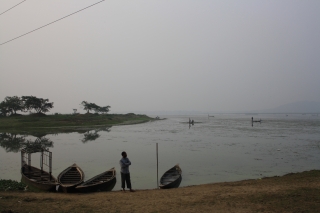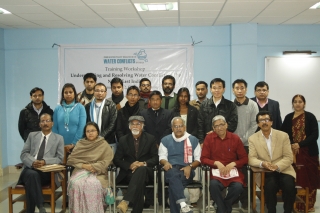Guest post by: Raju Mimi
The North East India, known for its rich water resources is endowed with the highest hydro-power potential in the country. It is one of the most geologically fragile, seismically dynamic and ethnically diverse regions in Asia. The region is part of the two large river systems of the world, mainly the Brahmaputra and the Barak, which cuts across bordering countries and different states within North East India. Given the diverse hydrological landscape of the region coupled with the present development paradigm that disregards the traditional institutions in decision making, the North East today is in the midst of emerging conflict.
It is in this backdrop that a training programme aimed at introducing participants to the basic concepts, debates, theoretical and analytical approaches and emerging issues related to water, water conflicts and their resolution, especially in the context of the North East India was held in Guwahati on January 23-26, 2012.
The workshop titled as "Understanding and resolving water conflicts in the North East India" was organized by Forum for Policy Dialogue on Water Conflicts in India (Forum), in collaboration with Aaranyak (Guwahati), Centre for the Environment - IIT (Guwahati), Arghyam (Bangalore), SaciWATERs-CapNet Network (SCaN) and Cap-Net.
Welcoming the participants from different parts of the North East on the first day, Dr Chandan Mahanta of Centre for the Environment, IIT, Guwahati said considering the enormity of conflict situation in the North East, the workshop is a good start to have an academic engagement to solve and understand water conflicts in the region.
Participants from different parts of the North East and the rest of the country
In trying to address and resolve water conflict issues, we must identify different stakeholders, and take the side of the most vulnerable people so that they get their due, he said. He, however, said that in North East common discourse on resolving water conflict issues is yet to start. He urged the participants to make a beginning in this regard by being a partner in resolving water conflict issues.
The chief guest of the training programme, Dr Indrani Dutta, Director, Omeo Kumar Das Institute of Social Change and Development, Guwahati said though North East is in the middle of an emerging water conflict, not many are aware about it. Ordinary people are not concerned about the issue till it affects them individually, she said. In the North East, natural resources are owned by the communities and when state intervention on these resources takes place in the form of developmental projects, conflict is bound to happen, said Dr Dutta.
Amidst all these issues, conflicts have a positive aspect too, said Professor DC Goswami, retired Head of the Department of the Environmental, Guwahati University, who also chaired the session. “We, at this point of time, know so much about water,” he said and added “Knowledge is coming from things that are unfolding in the outside world because of the changing dynamics. In persistently solving our problem arising out of conflicts due to our complex life style, we emerge through all this turmoil, engaging in dialogue, discussion and acquire more knowledge. “
Continuing with the discussion on water conflicts in the North East, Dr Mahanta said, the key challenge to sustainable development is our capacity to realize and mitigate future water conflicts. “The problem with the natural system is that when threshold is crossed, the collapse can be imminent and huge with so much of irreversibility that we don’t know where exactly is the threshold.” Suggesting remedial measures for preventing environmental disasters, Dr Mahanta said, in environmental discourse, the factor of ignorance is too high and when we have no certain answers, it is best to apply precautionary principles.
Another source of potential conflict is misplaced prioritization, said Dr Mahanta. “India stakes claim to use of water by building more hydro projects on trans-national rivers, but why stake claim only through hydro-projects? Why not develop drinking water systems, recreation facilities and irrigation? None of the hydro projects we see in Brahmaputra river system has been adequately studied and the geo-physical and environmental studies, which should be the foundation of the project, is coming much afterwards.”
“In the North East today, there is manifestation of violence everywhere, people are really unhappy because something very irreversible happening,” he said. “Though water is not central to such discontent, it should not become the source of conflict in the future. However, there is little scope for conflict resolution as most of the projects are decided in Delhi and we have to accept as it is. The change needs to be made at the policy level,” said Dr Mahanta.
Speaking on the trans-boundary water conflicts, Professor Goswami said time and again reports have surfaced that the Chinese government is planning to divert water of Yarlung Tsangpo northwards and also plans to build dams of 40,000 MW generating capacity. Such ambitious plans, however, are going on without any discussion between India and China. Government of India on other hand ignores such reports and China has also not officially confirmed the plan. But given the tremendous challenge of China to provide water to its dry north, future conflict over river water sharing between India and China cannot be ruled out, said Professor Goswami. He urged the Indian government to adopt a total Himalayan policy and to discuss it with China so that issue of climate change can be addressed as well.
Expounding further on the topic, Professor Goswami said, “On July 2011, a rush of flood-waters rolled down from China into Indian territory, the district of Siang in Arunachal Pradesh. But the two governments did not talk as there is absence of proper protocol. To further add to this, lack of knowledge on the whole issue made some Indian papers report, that China has detonated an atomic device causing the flash flood !” “Despite all this,” said Professor Goswami, “there is no mutual agreement on river Brahmaputra, but only on exchange of some flood data. India is not in position to raise the issue of downstream water issues with China as it has now devised its own plan to build 168 dams in the North East without consulting lower riparian countries or even its own states in the North East."
Women and water conflicts
Ms. Jarjum Ete, Chairperson of Arunachal Pradesh Rajiv Gandhi Panchayati Raj Sangathan (APRGPRS), and women rights activist from Arunachal Pradesh spoke on the topic, ‘Women and water conflicts’ on the second day of the workshop. She said, though women are traditionally not part of the decision making processes - within the family, village or community in a tribal society - because of the conflict situation in the North East, they are now coming to the forefront. She said, women can no longer be outside the decision making process. Women are looked upon as pillars of the community, as they are involved in tilling the land as well as managing resources. However, these aspects of a traditional tribal society where women largely take the role of guardians of the community resources are not taken into account by the policy makers. Hence, women will be at the receiving end when development interventions start taking place and control of collective resources owned by the community is taken over, said Ete.
The Indian river dolphin - Loss of habitat
A field visit to Kulsi river, one of the tributaries of the Brahmaputra at Kukurmara was organized for the participants on the third day. The river has the presence of approx 27-29 fresh river dolphins. Around the world only four species of fresh water dolphins are found. The Indian river dolphin - Platanista gangetica gangetica found in river Kulsi has the status of national as well as state aquatic animal of Assam. It is an ‘endangered species’ and has an average life expectancy of 35 years.
Sand mining, a lucrative business option for the young of Kukurmara have been going on for 25-30 years. It has lowered the river bed, making it unsuitable as an ideal dolphin habitat. Village elders are opposed to sand mining which results in a conflict situation. The elders are dependent on the dolphin for fishing and are emotional about the loss of habitat for the species. The villagers have been conducting awareness for the conservation of dolphins.
The participants also visited Deepor Beel, located south-west of Guwahati city. It is a permanent freshwater lake, and is also marked as a wetland under the Ramsar Convention. The lake was listed a Ramsar site in November 2002, in order to enable conservation measures on the basis of its biological and environmental importance.

Conflict resolution
On the fourth day of the workshop, Beth Fascitelli, Head of Consulting, Meta-Culture, Bangalore, took the session on ‘Conflict resolution: Common challenges and some approaches to creating sustainable solution’. She conducted some simple exercises where the participants learned to resolve day to day conflicts through dialogue and collaboration. Earlier, similar session on ‘Methodologies for conflict resolution’ and ‘Multi-stakeholder dialogue as a possible way of conflict resolution’ was conducted by KJ Joy representing the Forum, on the third day.
Continuing the session, Professor AC Bhagabati, former Vice Chancellor of Arunachal University delivered the lecture on ‘Traditional/customary/local ways of conflict resolution in NE India’. He cited examples of Adi and Apatani tribe of Arunachal Pradesh and their traditional methodologies to resolve conflicts. He also spoke on the emergence of newly educated elites in Arunachal and their role in resolving conflicts in their community. The first case he presented was on Apatani tribe on how the High School Students Union intervened to stop the practice of killing of 'Mithun' (a semi-domesticated animal) to shame their enemies. The other case he cited was on initiative of the Muklom Students Union of Tangsa tribe in stopping killing of twins in a village.
The workshop concluded on the fourth day with a panel discussion chaired by H. N. Das, retired Chief Secretary, Government of Assam. The panel members included Professor Bhagawati, Samudra Gupra Kashyap, journalists from The Indian Express, Dr Gorky Chakroborty from the Institute of Development Studies, Kolkatta and Nirmal Bhagabati, Senior Program Officer, World Wildlife Fund.
Read a report on the various presentations made at this workshop.






 Training_programme_on_understanding_and_resolving_water_conflicts_in_the_North_East_Guwahati_23_26_January__2012.JPG
Training_programme_on_understanding_and_resolving_water_conflicts_in_the_North_East_Guwahati_23_26_January__2012.JPG







